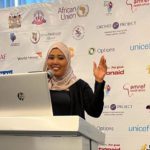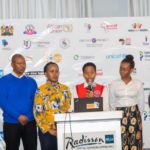“My daughter, our culture requires girls to go through the cut to become a woman.” These were the words of Grace’s mother before she underwent the cut a few days later in Narok East Sub County in Kenya.
“I recall that morning when women had gathered at our home; their spirits were jovial which was an indication of a ceremony. I didn’t know this was the D-day, the day that my mother spoke of. The day that altered my life forever. I was still young and a pupil in standard seven.” Narrated Grace.
Being young, Grace did not have the strength nor the voice to resist the pressure from the community, especially her father who was adamant that she must go through FGM/C in order to become a responsible woman. There are many myths and messages that surround the practice of FGM/C, with the most common message passed to girls and young women is community acceptance.
“I recall how four women held my legs and back when I was being cut. The experience was painful that I ended up wishing no other person should ever go through what I faced.” Grace shared. “I dropped out of school for a year in order to heal.” Grace added. “FGM denied me a chance to become a lawyer, which was my childhood dream.”
FGM/C is recognized internationally as a violation of human rights; however, despite this, 200 million girls and women alive today have undergone FGM/C and it is estimated that an additional 68 million more will be cut between 2015 and 2030. It is also often viewed as a rite of passage which unfortunately, can result to serious health complications, including infections, chronic pain and infertility.
I now champion an end to FGM/C
The Girl Generation (TGG): Support to the Africa Led Movement to End FGM/C Programme, through its consortium partner Amref Health Africa began to hold forums that sensitized community members on matters FGM in Narok County of Kenya. The programme seeks to contribute to a significant reduction in the practice of FGM/C by 2025 in four focal countries in Africa: – Senegal, Somalia, Kenya and Ethiopia.
“In one of the forums that I attended, I noticed that it was not just survivors of FGM/C but also women who were female circumcisers. Part of the training session encouraged female circumcisers to seek alternative livelihoods instead of earning a living through cutting girls. However, for me, this was where I gathered the courage to crusade against FGM/C. Amref Health Africa have since been a part of my journey and have continued to provide me with the necessary tools to advocate against FGM/C.” Said Grace.
The Girl Generation (TGG): Support to the Africa Led Movement to End FGM/C Programme, envisions a world where girls and women can exercise their power and rights and have expanded choice and agency and be free from violence, including FGM/C. One way to achieve this is through girls exercising their own power.
In most cases, communities that practice FGM/C and other forms of human rights violation such as child marriages curtails girls and women’s ability to exercise their power. Allowing girls and women to understand the power within which includes them understanding their own self-worth and knowledge, gives them the ability to own their agency.
“One thing I am proud about being in Kenya is President Uhuru’s commitment to ending FGM/C by end 2022. This means that there’s an opportunity to eliminate this violence against girls and women, with good partnerships between civil society organisations, county commissioners, village elders, community members and security organs.”
To-date, Grace says both her mother and father have changed their attitude towards FGM/C and they too have been converted to be anti-FGM/C crusaders. “I inform the area chief whenever I hear of an attempt to cut a girl. This has gone a long way in averting many incidents that would have occurred.”
The Girl Generation (TGG): Support to the Africa Led Movement to End FGM/C Programme, is a consortium led by Options Consultancy Services, includes Amref Health Africa, ActionAid, Orchid Project, Africa Coordination Centre for Abandonment of FGM/C and University of Portsmouth. It works closely with the Population Council’s Data Hub, the programme’s data and measurement arm.



